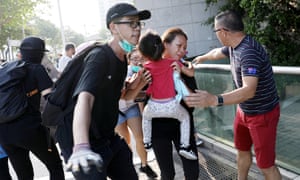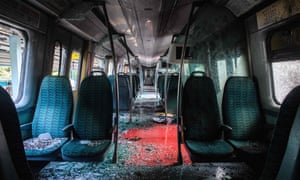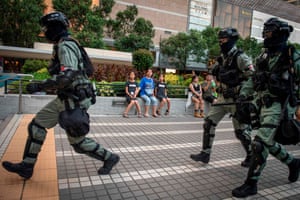The ongoing political crisis in Hong Kong is probably the biggest challenge of my life. I don’t remember having lost sleep and appetite and not being able to think about anything else for months on end ever before.
Like many other Hongkongers, I have been overwhelmed by an acute sense of helplessness and anxiety during the past five months as I have watched our home descend in to a war zone every few days.
Every time I go out to report my children’s voices sound a note of caution: “Take care, mummy!”. It feels like I am going to a battlefield whenever I pack a helmet and a gas mask into my bag.
I have been riding an emotional roller coaster since June as peaceful protests to fight an extradition bill that would have allowed people to be sent for trial in China morphed into a broader and increasingly radical anti-government movement.

It has unleashed years of bottled up anger and frustration at a Hong Kong government under Chinese rule that has no mandate from its people but is answerable to Beijing.
When the government introduced its emergency law to ban face masks in October, it signified to many the start of authoritarian rule to bypass the legislature and impose further restrictions on civil freedoms.
It was an ominous signal; perhaps a turning point.
When the metro was shut down by the authorities, a surreal sense of unease took hold in the city. Shops were shuttered. Children’s weekend activities were cancelled. All public leisure facilities were closed.
A new Hong Kong extradition law is proposed, which would allow people to be transferred to mainland China for a variety of crimes. Residents fear it could lead to politically motivated extraditions into China's much harsher judicial system.
Large public demonstrations start as thousands march in the streets to protest against the extradition bill.
Hong Kong's leader, Carrie Lam, introduces concessions to the extradition bill, including limiting the scope of extraditable offences, but critics say they are not enough.
The scale of protests continues to increase as more than half a million people take to the streets. Police use rubber bullets and teargas against the biggest protests Hong Kong has seen for decades.
Lam says the proposed extradition law has been postponed indefinitely.
The protests continue as demonstrators storm the Legislative Council, destroying pictures, daubing graffiti on the walls and flying the old flag of Hong Kong emblazoned with the British union flag. The protests coincide with the 22nd anniversary of the handover of Hong Kong from the UK back to China.
Armed men in white T-shirts thought to be supporting the Chinese government attack passengers and passers-by in Yuen Long metro station, while nearby police take no action.
44 protesters are charged with rioting, which further antagonises the anti-extradition bill movement.
By now the protest movement has coalesced around five key demands: complete withdrawal of the proposed extradition bill, withdrawal of the use of the word "riot" in relation to the protests, unconditional release of arrested protesters and charges against them dropped, an independent inquiry into police behaviour and the implementation of genuine universal suffrage.
The first charges are brought against protesters for covering their faces, after authorities bring in new laws banning face masks in order to make it easier to identify or detain protesters.
Chan Tong-kai, the murder suspect whose case prompted the original extradition bill is released from prison, saying that he is willing to surrender himself to Taiwan. The extradition bill is also formally withdrawn, a key demand of protesters.
Chow Tsz-lok, 22, becomes the first fatality of the protests. Chow, a computer science student at the Hong Kong University of Science and Technology (HKUST), was found injured in a car park in Tseung Kwan O in Kowloon, where he was believed to have fallen one storey. Protesters had been trying to disrupt a police officer’s wedding, which was being held in the area. A week later a 70-year-old cleaner who is thought to have been hit by a brick during a clash between protesters and pro-Beijing residents becomes the second person to die.
My family took a taxi to the seaside, where there was no lifeguard on the beach. We were held up on our way back by roadblocks set up by protesters. Our children were terrified at the prospect of riot police coming with tear gas, so we got out of the taxi and scrambled away as quickly as we could.
We did not know at the time that this sort of unpredictability would become the new normal. Last week, after conflict escalated when a policeman shot a protester during morning rush hour and police entered university campuses and engaged in violent clashes with students, much of the city was paralysed. Roads were blocked by protesters and police, while many bus routes, metro stations and lines were closed.

Each flare-up means many people are stranded at home unable to get to work. Schools are shut. Universities ended term early. Even those who manage to get to work worry about whether they can get home. Many who work in the financial district daren’t go out to lunch after police threw tear gas at protesting office workers early last week. Social lives grind to a halt as restaurants and shops close early and concerts and events are cancelled or have to end early. For many, it’s effectively a curfew.
The protests affect even wedding plans – a friend had to find a different church to avoid the possibility of guests having to brave tear-gas-filled streets.
As everyone’s lives are disrupted, emotions run high and relationships are strained, causing family rifts and splitting friendships. Casual conversations escalate into blazing rows; are you in the yellow (pro-democracy) camp or the blue (pro-China/government) camp is the dividing line.
Couples become estranged. Parents and children stop talking to each other. Families and friends try to avoid mentioning politics over the dinner table but often fail.
Many of my friends, especially those with families, are planning to emigrate – driven by fears that their children will have to grow up in a society where Hong Kong’s core values are lost.
As schools across the city have been suspended over the past few days, Hong Kong’s rigorously academically drilled children are enjoying rare days of free play in parks. I don’t know whether I should laugh or cry when I see them play “black cops” and “protesters” and throwing “tear gas” at each other. I guess the recent unrest has already made an indelible mark on them and will remain in their memories for the rest of their lives.
It’s particularly poignant, given that most people in Hong Kong are children or grandchildren of refugees who fled China during war, famine or political upheaval.
My own grandparents fled with their seven children in a crowded train to Hong Kong in 1949, just months before the Communist party took control of China. My father recounted how they slept on tables and chairs at a school when they first arrived.
The international metropolis and regional financial hub we see today was built in just decades after the second world war through the hard work of my forebears, and refugees like them.

Just a generation or two later, will their offspring have to flee again?
The majority of Hongkongers, especially the young, cannot afford to emigrate. And they know very well that China is a powerful regime that they have no means to fight against.
I have asked many protesters why they continue to engage in endless street battles with the police where they only get injured and arrested – with riot charges carrying a maximum sentence of ten years – when there is little hope of winning further concessions. I asked whether they have considered that, after five months of resistance, the escalated actions have given the authorities justification to impose draconian policies and Hong Kong people are left with less civil freedom than we had to start with.
They say peaceful protests have got them nowhere and they are not afraid of sacrificing their lives in one last fight for Hong Kong. “If we burn, we burn together!” many say. “Hong Kong is dying anyway, so we might as well make a last struggle.”
I was pained by their hopelessness but I warned them that history is full of examples of violent revolutions overthrowing one dictatorship, only to see it replaced by another.
“So what is your solution then?” they asked. I was speechless.
Follow Guardian Cities on Twitter, Facebook and Instagram to join the discussion, catch up on our best stories or sign up for our weekly newsletter
